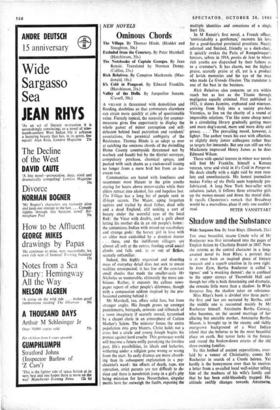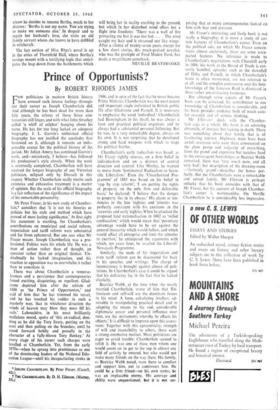Shadow and the Substance
Wide Sargasso Sea. By Jean Rhys. (Deutsch, 21s.)
THE once beautiful, insane Creole wife of Mr Rochester was first introduced into the pages of English fiction by Charlotte Brontë in 1847. Now she returns as the central character in a long- awaited novel by Jean Rhys; a portrait that is at once both an inspired piece of literary research and a superb creation in its own right. In Jane Eyre, Bertha Rochester is called 'a tigress' and 'a mocking demon'; she is confined to the upper storeys of Thornfield Hall and though her role is both threatening and dramatic, she remains little more than a shadow. In Wide Sargasso Sea, the shadow takes on substance.
Miss Rhys's book is divided into three parts : the first and last are narrated by Bertha, and the middle one is recounted mainly. by Mr Rochester himself. Antoinette Bertha Cosway, who becomes, on the second marriage of her alluring but unstable mother, Antoinette Bertha Mason, is brought up in the steamy and richly overgrown background of a West Indian island that she believes to be the most beautiful place on earth. But terror lurks in the forests and round the broken-down estates of the old slave-owning families.
To this hotbed of ancient superstitions, over- laid by a veneer of Christianity, comes Mr Rochester in search of a Creole heiress. Yet hardly is the honeymoon over than he receives a letter from a so-called local well-wisher telling him of the madness of his wife's family and that he has been cold-bloodedly trapped. His attitude swiftly changes towards Antoinette, whom he decides to rename Bertha, much to her distress: 'Bertha is not my name. You are trying to make me someone else.' In despair and to regain her husband's love, she visits an old family servant whom she knows to have dabbled in witchcraft.
The last section of Miss Rhys's novel is set in the attics of Thomfield Hall, where Bertha's ravings mount with a terrifying logic that antici- pates the leap down from the battlements which will bring her in reality crashing to the ground, but which in her disturbed mind offers her a flight into freedom: 'There was a wall of fire protecting me but it was too hot. . . . The wind caught my hair and it streamed out like wings.' After a silence of twenty-seven years, except for a few short stories, this much-praised novelist, who was the protegde of Ford Madox Ford, has made a magnificent comeback.
NEVILLE BRAYBROOKE







































 Previous page
Previous page